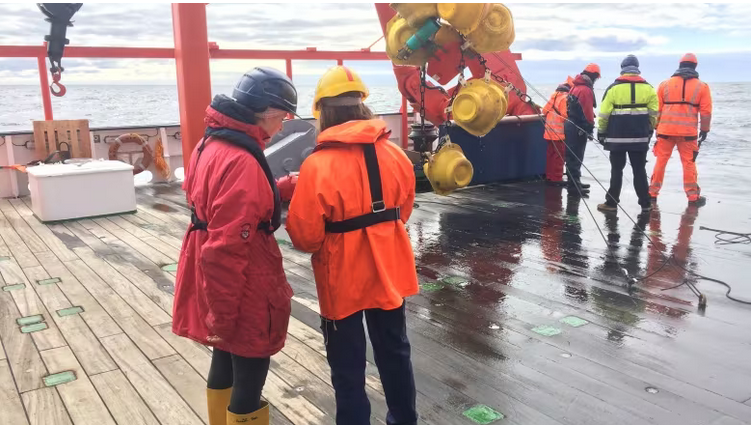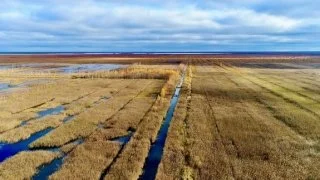A new American study has confirmed southeastern British Columbia coal mines are contaminating waters shared by Canada and the U.S., adding the miner’s attempts to remove selenium from wastewater aren’t making much difference to the amount flowing south. “It’s making a small dent,” said Meryl Storb of the United States Geological Survey, lead author of the newly published study.
Atlantic hurricanes rapidly churning into intense storms over warming water, study finds
The list of destructive post-tropical storms and hurricanes which have tracked through Atlantic Canada over the past few decades is an increasingly lengthy list. From Juan in 2003, Igor in 2010, Dorian in 2019 and Fiona in 2022, plus the many other damaging storms that have moved through, this region is certainly in a period of high tropical-storm activity.
Here's what could happen if the Canadian government classifies 'forever chemicals' together
"These chemicals don't get bound up by soils and in the bottom of lakes and oceans. They stay in the water. That means they circulate around, and it also means that these chemicals get into our drinking water," Diamond told CTVNews.ca in an interview earlier this year. The federal government is looking into how to regulate the chemicals, considering an approach of putting PFAS into new classes, different from the individual classification now.
Water from nearly half of U.S. faucets contains ‘forever chemicals’: study
Drinking water from nearly half of U.S. faucets likely contains “forever chemicals” that may cause cancer and other health problems, according to a government study released Wednesday. The synthetic compounds known collectively as PFAS are contaminating drinking water to varying extents in large cities and small towns — and in private wells and public systems, the U.S. Geological Survey said.
Nova Scotia Health researching cancer risks in hundreds of communities
Rising levels of chloride, aluminum in Halifax lakes a concern, study says
Levels of chloride, arsenic and aluminum in some Halifax lakes are a concern, according to a newly published Dalhousie University study. The peer-reviewed study examined four decades of water quality data from 50 lakes. It says that concentrations of aluminum in 29 per cent of the lakes, chloride in 20 per cent of the lakes and arsenic in one lake exceeded Canadian aquatic life protection guidelines.
The world’s largest lakes are shrinking dramatically and scientists say they have figured out why
More than half of the world’s largest lakes and reservoirs have lost significant amounts of water over the last three decades, according to a new study, which pins the blame largely on climate change and excessive water use. Roughly one-quarter of the world’s population lives in the basin of a drying lake, according to the study by a team of international scientists, published Thursday in the journal Science.
Ottawa grants $154M to Dalhousie-led study on North Atlantic and climate change
Dalhousie University in Halifax will lead what it calls "the most intensive investigation ever into the ocean's role in climate change" thanks to $154-million in federal funding announced Friday. The research program is getting a piece of $1.4 billion awarded to Canadian universities by the federal government through the Canada First Research Excellence Fund.
Swimming pools and lavish gardens of the rich are driving water shortages, study says
Swimming pools, flower gardens, indoor fountains — and the urbanites who can afford them — are big factors behind the increasingly dire water crises plaguing cities, an international research team says. Published in the journal Nature Sustainability, a new study found socioeconomic disparity to be just as influential as climate change and population growth when it comes to explaining why the water supply in so many cities is shrinking.
Antarctic Ocean Currents Headed For Collapse, Driving 'mass Slowdown' In Water Circulation
The rapid melting of Antarctic ice poses a threat to halt deep ocean currents, which would have a negative impact on the climate, the movement of fresh water and oxygen, as well as nutrients necessary for life, for centuries, as per claims from the scientific community, reported by DW. Deep ocean currents surrounding Antarctica may slow by more than 40% over the course of the next 30 years, according to a recent study that was published in the journal Nature on Wednesday. According to the study, in a high-emission scenario, the "overturning circulation" of the ocean's deep waters will reduce by 40% by 2050, with consequences lasting "for generations to come."
Study reveals global algae blooms are growing, and warming waters may be to blame
Swirling blooms of turquoise phytoplankton along coasts may be happening more often and getting bigger, according to new research published in Nature, raising concerns about the impacts of climate change on the world's oceans. Using data captured by NASA's Aqua satellite, scientists have tracked coastal phytoplankton blooms over 17 years, between 2003 and 2020.
A second chance to protect wetlands
Wetlands are among the most threatened ecosystems in the world. A new study, published in Nature, has found that the loss of wetland areas around the globe since 1700 has likely been overestimated. This is good news overall, however, the global picture hides significant variations, with several regions and distinct wetland types under significant levels of pressure. For instance, temperate river floodplains have been highly impacted while remote boreal-arctic peatlands remain comparatively unharmed. While wetland conversion and degradation has slowed globally, it continues apace in some regions, such as Indonesia, where large swaths of land are being cleared for oil palm plantations and other agricultural uses. This new global perspective on wetland loss can help prioritize conservation and restoration actions.
New Study Reveals Innovative Water Protection Systems Significantly Reduce Losses from Water Damage Claims in Commercial Real Estate.
Eddy Smart Home Solutions Ltd.'s (Eddy) (TSXV: EDY) is pleased to share findings of a recent study completed using data from a 5-year period on the effectiveness of water protection systems in reducing losses from water damage claims. Conducted by Aon Canada's Real Estate Practice, the study found that the proper installation, monitoring and use of water leak detection technologies can significantly reduce the total damages incurred for insurance water damage claims for owners of commercial real estate operations.
Governments exploring non-potable water source for Manitoba industrial park
The provincial and federal governments are teaming up to determine the feasibility of a non-potable water source in a Portage la Prairie-area industrial park. On Wednesday, the governments announced they are committing $55,000 to study the possibility of a non-potable water source for tenants of an industrial park in the RM of Portage la Prairie. The water source would be used for non-food processing purposes at the Poplar Bluff Industrial Park.
Most of Western Canada's glaciers will melt in 80 years, University of Northern B.C. study finds
A study by international researchers using a supercomputer at the University of Northern British Columbia (UNBC) has found that most of Western Canada's glaciers will disappear by the year 2100. The study, "Global Glacier Change in the 21st Century: Every Increase in Temperature Matters" was published Thursday in the journal Science. "A child born today will witness the near-complete disappearance of one of western Canada's most iconic symbols glaciers," reads a statement from the university.
Is road salt killing salmon in B.C. streams? UBC researchers trying to find out
University of B.C. researchers are embarking on a five-year study to find out whether road salt is contributing to salmon mortality in B.C. streams. The team, led by Patricia Schulte, Chris Wood and Colin Brauner, also involves dozens of volunteer stream-keepers at 30 streams or creeks. Schulte, a professor in the Department of Zoology at UBC, said as the ice melts on the roads, it runs down into freshwater streams or can seep into the groundwater. Researchers know the salt can harm baby salmon or trout but what they don’t know yet is how much of the salt is winding up in the water.
Contamination of Grand River coming from upstream
A study measuring the quality of water in the Grand River found the majority of pollutants are coming from municipalities upstream and are concentrated around Fairchild Creek. Pesticides, e-coli, and human waste by-products are all present in the Grand River but the state of the art treatment plant in Ohsweken is filtering most of that out, according to one of the study authors, Marsha Serville-Tertullien, from Trent University. She recommended Six Nations tell municipalities up stream to clean up their act in order to reduce potential contaminants in Six Nations’ drinking water.
Fluoride in drinking water not associated with emotional, behavioural issues in kids: study
Childhood exposure to fluoride through public tap water isn’t associated with any emotional or behavioural issues, nor any negative executive functioning in adolescent years, according to a new study from Australia. Researchers looked at more than 2,600 children in a longitudinal study that compared children who had spent their lives drinking fluoridated tap water with those who hadn’t, in order to see if exposure to fluoride in drinking water had any negative impacts.
Study of fish populations in Saint John Harbour shows 'surprising diversity'
When ACAP Saint John set out on a four-year study of fish life and water quality in the Saint John Harbour, the environmental group wasn't setting out to answer any big questions. The study, which began in 2018, was designed to set a baseline for the general health of fish populations in the harbour. No one had made an effort to see how many species of aquatic life were in the tidal waters of the harbour, and in what numbers. Roxanne MacKinnon, the executive director of ACAP, said they were surprised by what they found.
Arctic Ocean acidifying up to four times faster than any other sea on Earth
What may be the broadest and longest study to date has found Canada's Arctic Ocean is growing more acidic up to four times faster than any other sea on the planet. The acidification, linked to the loss of sea ice, will have unknown repercussions for the life in those waters, said Wei-Jun Cai, an oceanographer at the University of Delaware and co-author of the study in the journal Science.





















